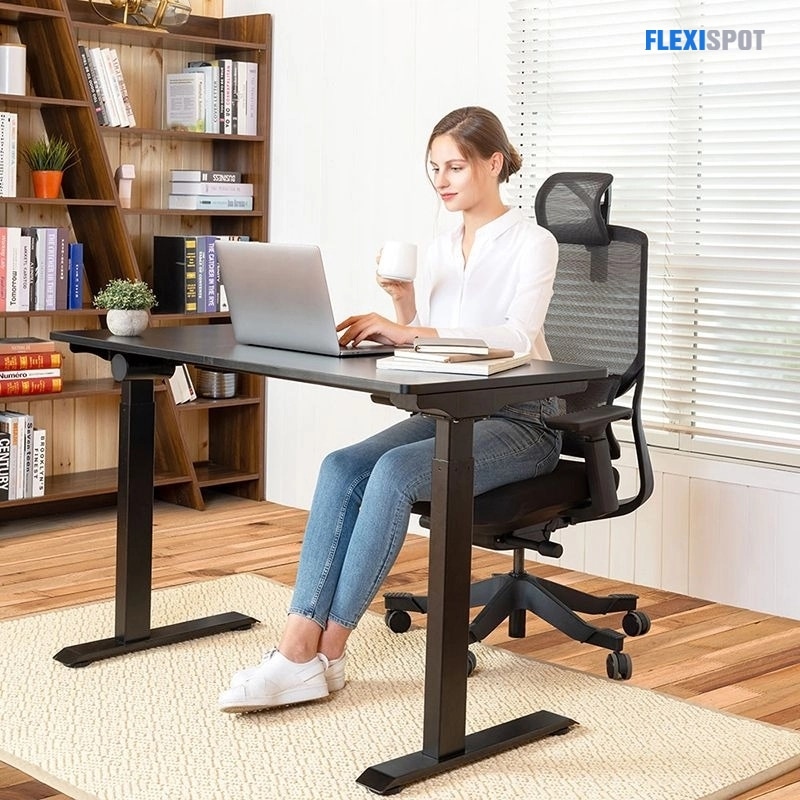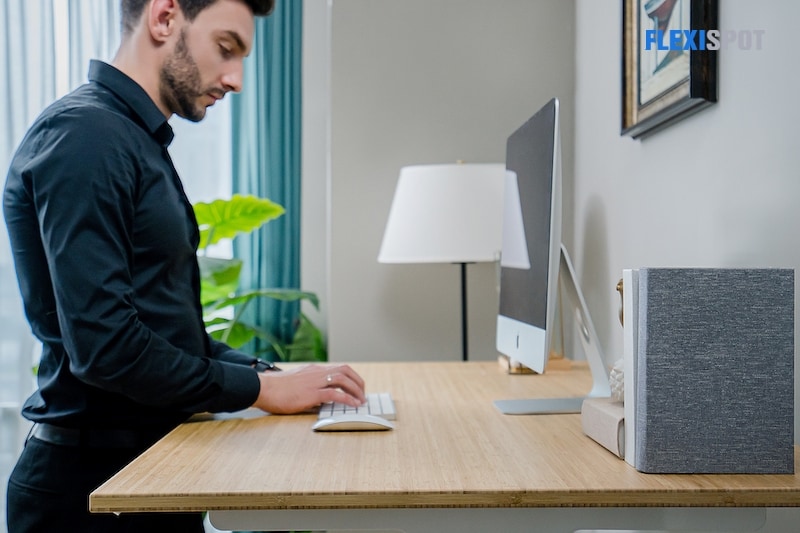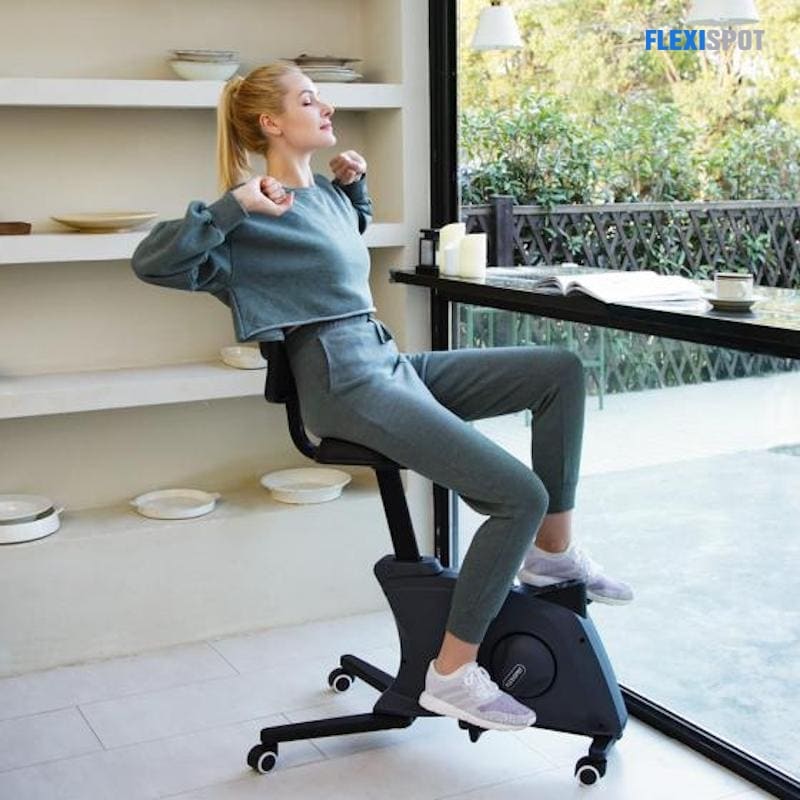Is your desk job keeping you down (literally)? Sitting on your bottom all day, every day?
Because they are in the same posture for long periods, nearly one-quarter of individuals attribute their aches and pains to their workplace environment. After all, we spend the majority of our days working and frequently seated, and we don't have the option to get up and go home when the discomfort becomes unbearable. The decisions we make at work have a significant impact on health and well-being. We spend about 1,800 hours per year at work, so even the simplest decisions can influence long-term. Busy professionals are preoccupied with various issues, ranging from deadlines to managing relationships and juggling various duties. Healthy practices that are complex or difficult to keep are unlikely to remain.
We are not built to sit for long periods. Sedentary practices weaken the body and do not promote healthy metabolism, digestion, or posture. When you sit for an extended time over months or even years, your posture suffers, and your general muscle tone deteriorates. A lack of activity can also lead to poor digestion and an overall lack of energy. The human body is a progressive system that requires movement, and sitting for long periods can cause musculoskeletal problems and many other health problems.
With the World Health Organization now ranking inactivity as the fourth leading cause of adult mortality, it's time to improve our patterns and stop believing it's okay to come into work and park yourself at your desk for most of the day. The simple things add significantly, so here are some suggestions to get you started on creating better, healthier habits.
Get to know what your options are
On-site gyms and healthy eating options aren't only for Google employees. Start by discovering more about your company's employee-wellness benefits and perks: you might be stunned to find out on-site chiropractic service, weight control counseling, and savings on fitness club subscriptions. Use your choices once you've learned about them; after all, they're part of your overall pay package.
Replace your chair
Speak with your manager about switching to a more comfortable chair that encourages excellent posture and does not place excessive pressure on the back muscles and spinal discs. Not being able to droop all day can help improve your posture and ensure you sit in the proper sitting position. We recommend office chairs with lumbar support and many adjustment options, such as the Flexi-Chair Oka Office Chair BS9.
But then, refrain from sitting too much
The typical person sits 9.3 hours per day instead of 7.7 hours of sleep per day, which hurts our health, well-being, and mental state. After just an hour of sitting, the synthesis of fat-burning enzymes drops by up to 90%. You will discover a new source of productivity by incorporating more movement into your day. Your adjustments on this front do not have to be spectacular. During your breaks, go outside to have your lunch or get a cup of coffee. If you're confined in a consulting room, make a point of standing up and stretching every 30 minutes. Try not to sit for more than 30 minutes at a time without getting up to walk around and move.
Walk while talking
Any meeting that you're not compelled to look at a computer monitor is an opportunity to take a walk and maybe get some fresh air and natural light. Walking side-by-side and in tandem with someone, mainly if there is only one other person present, allows issues to be addressed more openly and enables both individuals to have a forward-thinking attitude. Walking meetings are less contentious, more transparent, more collaborative because they burn calories and increase blood circulation. Phone calls can also be made while walking, which frees up creativity and puts you in a more energetic and optimistic mind.
Drink your water
You are already dehydrated when you are thirsty. Consequently, you may feel sluggish, angry, less able to focus, and antsy, and that's a bad combination that can wreck your workday. If sipping plain water sounds tedious, buy an infusion bottle and some fruit and herbs to jazz it up.
Consider using a standing desk
Sitting at a desk is not for you if you suffer from back pain. Standing desks have been demonstrated in preliminary studies to help with upper back and neck pain. If you're hesitant to attempt a standing desk, choose one of the convertible kits, which give you the option of sitting or standing while working. Standing desks are a new addition to the office, but studies show that they can boost energy and productivity, weight reduction, and decrease blood pressure.
To see the best standing desks for office and home, click here!
Exercise with your colleagues
Working out together would not only strengthen ties and encourage you to get to know your coworkers better, but it will also hold you accountable for completing the activity you know you should. This can be done before work, during lunch, or at the end of the day. The idea is to form a group that can encourage one another.
Make and bring healthy lunches and snacks
Plan and prepare meals the day before, or even better, at the start of the week. Even deciding what you'll be getting ahead of time, rather than choosing on the spur of the moment, will help you make healthier eating choices. If you're bored of the never-ending cycle of workplace food, consider packing your lunch and nibbles. It's the best way to manage what gets into your system. Home-cooked lunch should not have to seem like a sacrifice: pack foods and healthy snacks to work that you enjoy, switch it up, and celebrate the savings and increased energy levels that come. Consuming various carbs in the middle of the day will slow you down and cause a mid-afternoon crash. Instead, go for a salad.
Work while standing up
Large corporations such as Facebook and Google have done so to improve circulation and activity all through the day. Pick a spot where you can work standing up for long hours of the day. Many employees now have mobile phones and computers, so why not answer a few calls while standing up or write a report while standing on the top of a filing cabinet?
Ditch the junk food and sodas
Make it very simple to get healthier options and nutritious foods that will help boost productivity rather than drag it to a standstill. Keep nutritious food at your desk and/or urge your workplace to join up for a service. This is particularly pertinent for Millennials, a snacking group, having at least one meal consisting entirely of snacks every day and frequently snacking 2.5 times more than their parents.
Take mind breaks
Stand up from your desk, stroll over to the break room to replenish your bottle, or even do a quick stretching exercise to boost your workplace well-being. Those who need reminders about taking breaks may benefit from the Pomodoro Technique, which involves intensive spurts of 25 minutes of intensive work followed by a quick break.
Stretch
Anger frequently manifests as stiffness in the neck, shoulders, and upper back. Fear usually manifests itself in the pit of your gut. Acknowledge, experience, and release them with some easy stretching and deep breathing. The issue isn't that you're feeling regular emotions. It is clinging to them for too long.
Maintain a healthy and clean desk
If at all possible, avoid eating lunch at your desk. This can reduce your productivity and keep you feeling hungrier subsequently in the day. Try not to store unhealthy foods at your desk, as they will be the first thing you go for when stressed, and instead put some healthful snacks in your drawers, such as unsalted nuts and fruit. Don't forget to drink plenty of water during the day as this will aid with hydration and will remind you to get up and walk to the restroom regularly.
Your immune system will be able to deal with the majority of health threats without missing a beat. Stress and exhaustion, on the other hand, might undermine your natural defensive mechanism. It would help if you washed your hands. You could also clean your workstation and keyboard, tidy the bookshelves, and file old paperwork. It doesn't have to take too long if you just take 5 minutes to clear up at the end of the day.
Watch your posture
Good posture enables us to breathe more thoroughly and effortlessly, increases circulation and digestion (your organs have a little more room to function), and makes us appear more confident and collected. You can also purchase an exercise ball to help you maintain proper posture throughout your sitting day. Sitting on an exercise ball promotes bouncing, which gets the legs moving and, as a result, increases blood flow and keeps muscles active, reducing stress and weariness.
If an exercise ball isn't a possibility for your workplace, ensure your desk area is properly set up so that your feet will be on the ground when you sit. Your monitor is at eye level, and then frequently relieves your back by sitting upright in your chair and then twisting from side to side. It would be best if you also aimed to stand up hourly, stretch your arms up, and breathe deeply to bring your pelvis back to neutral and relax your lower back and hip flexors.
Remember gratitude and yourself
It makes no difference what you think about; what matters is that you allow yourself a minute of pure appreciation. When you focus on gratitude, it is pointless to be angry or scared. While all of these are acceptable feelings, they should not take over your day. Temper them by weighing in on what's going well in your life.
Your worldview speaks a lot more about you than about the world. You will not think well of others if you do not do the same for yourself. Appreciating oneself and the people around us is essential to living a happy, fulfilling life; therefore, don't overlook this important daily duty.
While it may be appealing to blame our hectic schedules for our neglect of health, this is not a justification. Even the busiest professionals can make simple healthy workplace improvements that can increase their productivity and make their lives happier and healthier throughout.


